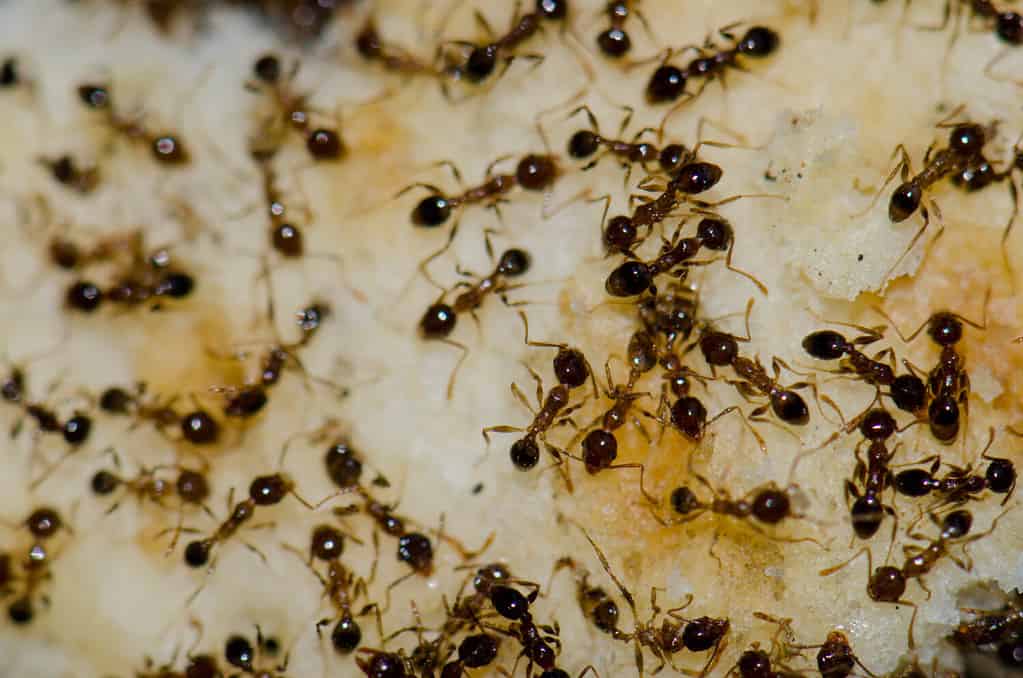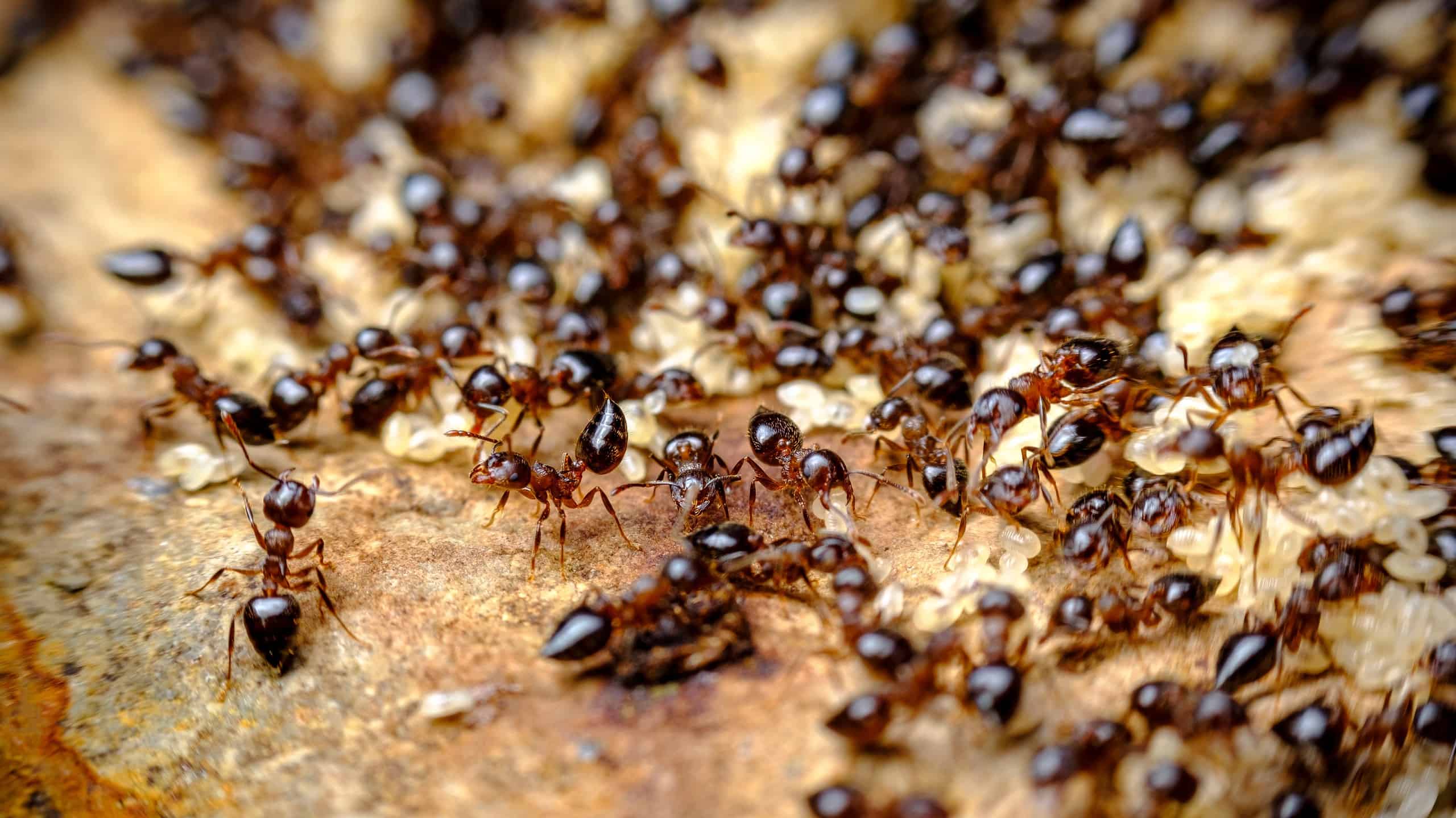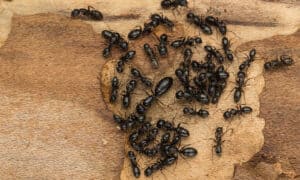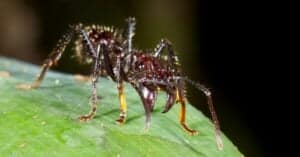Quick Answer:
- Possible reasons some people smell ants are that it’s a gene-related ability, or that you haven’t been paying attention.
- It’s believed ants release scent-producing chemicals when they feel threatened both to repel the threat and potentially to warn other ants of danger.
- The odorous house ant gives off a scent like blue cheese, while carpenter ants give off a sour, vinegar-like smell.
You probably haven’t leaned down to get a good sniff of an ant — that’d be weird. But those who can smell ants don’t need to get so close.
Discover why only some people can smell ants, learn what they smell like, and find out what other kinds of scents others can pick up on that you may not be able to!

Yes, some people can smell ants! It’s not just a specific type of ant, either.
©Asier Romero/Shutterstock.com
Can People Smell Ants?
Yes, some people can smell ants! It’s not just a specific type of ant, either. Many different types of ants release strong odors for a variety of reasons. Sometimes, it’s once they’ve been squished and other times, it’s when they sense danger. Ant researcher, Clint Penick at Kennesaw State University confirms that the common house ant is odorous and releases a stinky pheromone when squished. This chemical makes up part of a cluster of compounds identified as methyl ketones.
Each ant has a distinctive scent. Most of them are quite pungent and unpleasant but some are sweet and almost enticing. It’s believed ants release these chemicals when they feel threatened both to repel the threat and potentially to warn other ants that there is danger afoot. The way they communicate with scents is impressive. They’ve developed an incredible ability to communicate with one another based on the scents they emit.
Sometimes, they’re warning of danger but other times, they’re leaving a trail to alert other ants where the food is. They even rate the food based on the pheromones they emit. It’s like giving directions to your favorite restaurant and rating the dishes they serve! They can also distinguish one another based on which are workers and which are queens and can tell when an ant that doesn’t belong to their colony has invaded their nest.

It’s not entirely clear why only some people seem to pick up on the various scents ants emanate. However, the common consensus is that it’s a gene-related ability.
©Victor Suarez Naranjo/Shutterstock.com
Why Can Some People Smell Ants?
It’s not entirely clear why only some people seem to pick up on the various scents ants emanate. However, the common consensus is that it’s a gene-related ability. You may simply be lacking the gene that allows you to pick up on the scents. Another possibility is that you haven’t been paying attention. It’s easy to get caught up in your routine and move through life on auto-pilot but maybe it’s worth paying a little extra attention to these tiny workers and determining if you can pick up what they’re putting down!
What Do Ants Smell Like?
For those of you who haven’t smelled ants, the descriptions of what ants smell like may surprise you. While the thought of blue cheese and bacon atop a fresh wedge salad might make your mouth water, when the blue cheese smell is coming from an ant, it’s not exactly appealing. Remember Clint Penick, the ant researcher at Kennesaw State University? Well, he says the odorous house ant gives off exactly that scent. It’s a blue-cheese-scented pheromone. This same chemical is produced by Penicillium mold as well. Whether you love it or hate it, you know how pungent the smell of blue cheese is.
Carpenter ants smell a little different. When they’re not sure what’s going on and they feel like a threat is in their vicinity, they start emitting a sour, vinegar-like smell. That’s the formic acid they start spraying when defending themselves. You can probably guess what citronella ants smell like based on their names and you’d be right. Their scent is much like the citrusy scents that make your home smell clean. Other ants smell like olive oil and trap-jaw ants emanate a chocolatey scent when they’re squished.
What Smells Do Ants Hate?
Lavender, eucalyptus, mint, basil, oregano, and thyme are all plant options to keep ants from invading your home. Additionally, cinnamon is a powerful solution for eliminating ants.
When ants come into contact with cinnamon, it causes them to suffocate. Killing them fairly instantly. You can use ground cinnamon by sprinkling it along ant trails or around the entrance of an anthill. Additionally, cinnamon essential oil proves effective in keeping ants at bay.
Furthermore, simple household solutions can act as effective natural ant deterrents.
Natural ingredients such as:
- Salt
- Baby powder
- Lemon juice
- Chalk
- Vinegar
- Bay leaves
- Peppermint oil
These can be placed in areas where ants are present. By doing so, you can prevent them from using these pathways as entry points into your home.
What Other Smells Can Only Some Humans Pick Up On?

Genetics determines how you interpret another’s body odor and if you can smell what many refer to as “asparagus urine.”
©Kati Finell/Shutterstock.com
Genetics determine the color of your hair and eyes, your likelihood of developing certain diseases, and even some aspects of your personality. But they also determine what kinds of smells you can pick up on. There are even theories that present the idea that scent may be the reason some people couple up and why others repel one another. Genetics is also the reason you may produce stinky armpit sweat. Fun fact, right? It also determines how you interpret another’s body odor and if you can smell what many refer to as “asparagus urine.”
Yeah, it’s as gross as it sounds for those who can smell it. The inability to pick up on a specific smell has a name: anosmia. The explanation gets a bit complex, but basically, your olfactory receptor gene is affected by a unique variation in your DNA sequence. Harvard T.H. Chan School of Public Health ran a study to determine just how many people can smell asparagus and out of 6,909 participants, only 40% could pick up on the metabolites released via their urine after eating this green vegetable.
Thank you for reading! Have some feedback for us? Contact the AZ Animals editorial team.








